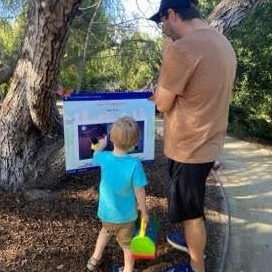While antibiotics have reduced the global burden of infectious disease, these miracle drugs are no longer working against emerging “superbugs.” A recent report from the UK estimates that, by 2050, nearly 10 million people are likely to die from drug-resistant infections if the current trends persist. In response, Professor Elena Ivanova and her team have generated bactericidal surfaces that physically rupture bacterial cells in a few hundred seconds without harming animal cells. The rapidness with which they kill ensures that there is little opportunity for bacteria to adapt and become resistant. In the middle of a global antimicrobial resistance crisis, Professor Ivanova’s work provides hope that we haven’t yet lost the fight against superbugs!
Having seen first-hand the increasing number of children with allergic reactions admitted to the RCH, Professor Katie Allen and her research group sought to identify the exact rate of food allergy in the population and devised the HealthNuts study. The study followed 5300 children from Melbourne aged 1 to 10 and assessed their reactions to specific foods known to commonly trigger allergic reactions (allergenic foods) – peanut, egg, cow’s milk and sesame. It found that over 10% of children had ‘challenge-proven allergy’, which is when a child is observed to have an allergic reaction to a specific food and treated in a safe clinical setting.
In accordance with our Rules, full RSV members (i.e. with voting rights) are asked to register their intention to attend this Special General Meeting of the Royal Society of Victoria at 5pm on Thursday 21st June, 2018, noting a quorum of 50 will be required. Members will be asked to endorse the Society’s proposal to raise significant funds to resource the future operations of the Society’s activities, as well as the refurbishment and extension of the Society’s headquarters at 8 La Trobe Street, Melbourne through a residential development project on the site formerly occupied by the Bureau of Meteorology.
A central component of the scientific method is the collection of data, the “life blood of science”, which can involve something as complex as colliding atoms in a particle accelerator, or simply taking a photo of an insect in your backyard. Citizen science is the collection and analysis of scientific data by anyone and everyone, with collaboration from professional scientists. One of the professional scientists who has embraced the use of citizen science in Australia, particularly in the area of biodiversity and entomology, is Dr Ken Walker.
FROM THE CEO – Today we’ve released our “Magic” proposal, a transformational vision to “supercharge” our mission to engage Victorian communities with science, establish an exciting new science communication and heritage hub in Melbourne’s CBD, and ensure that we’re around for another 160 years and beyond, promoting science across Victoria to the very best of our abilities. This changes everything – “Magic” is a once in a generation opportunity for the Society, and for Victoria, and I really hope you can support the initiative.






